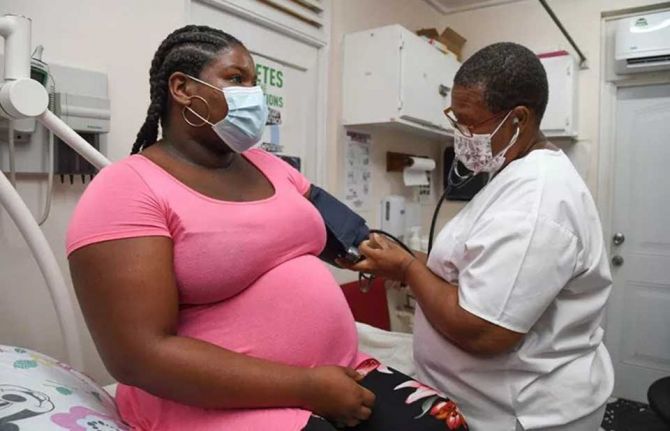

Feature Story
Integrated services and inclusion key to eliminating mother-to-child HIV transmission in Dominica
19 May 2021
19 May 2021 19 May 2021Over four consecutive years, no child in the eastern Caribbean country of Dominica was born with HIV, including in 2017 when, within two weeks, the island braved back-to-back hurricanes that ultimately damaged 90% of its infrastructure.
Dominica has now received validation from the World Health Organization (WHO) for the elimination of mother-to-child transmission of HIV and syphilis. It is the eighth Caribbean country or territory to have achieved this dual elimination goal—joining Cuba, which achieved it in 2015, and Anguilla, Antigua and Barbuda, Bermuda, the Cayman Islands, Montserrat and Saint Kitts and Nevis, which achieved it in 2017.
During a virtual ceremony, partners reflected on the mix of political, health-care and community components required to create a sustainable framework for preventing HIV and other illnesses in the maternal and child health context.
Roosevelt Skerrit, the Prime Minister of Dominica, reiterated the importance of the government’s commitment to the Sustainable Development Goal health agenda. He noted that the investments made in health infrastructure and systems would help Dominica reach other targets, including a “reduction in maternal and child mortality, universal access to sexual and reproductive health services and universal health coverage.”
“Dominica’s journey to this ambitious achievement represents a cumulation of years of expanding the capacity of its primary care services to address communicable diseases and adopting harmonized and integrated approaches to improving the health outcomes for women and their children within maternal and child health services,” said Carissa Etienne, WHO Regional Director for the Americas and Director of the Pan American Health Organization.
All pregnant women in Dominica are offered HIV and syphilis testing when they enrol for antenatal care. For those found to be positive, treatment is provided free of charge. Access to health services is available to everyone regardless of nationality. And Dominica now provides early infant diagnosis in-country, thereby ensuring accurate and timely care for infants exposed to HIV.
Health-care workers, including a cadre of community health nurses and staff of the National HIV and AIDS Response Unit, who coordinated psychosocial support and care services, were critical for the strategy’s success.
Critically, Dominica worked to strengthen its health information system so it could provide evidence relating to the coverage of antenatal care, testing and treatment services and their impact. The validation process also included assessments on human rights, gender equity and community engagement.
Meeting the rigorous data and reporting requirements for elimination of mother-to-child transmission certification is a key next step for several Caribbean countries that have already achieved remarkable gains in the prevention of mother-to-child transmission of HIV. Since 2010, the proportion of pregnant women living with HIV in the region receiving antiretroviral therapy to prevent transmission to their babies has doubled.
The Director of the UNAIDS Caribbean Sub-Regional Office, James Guwani, noted during the ceremony that next month the world will adopt a new United Nations political declaration on AIDS.
“One of the most powerful testaments to our capacity to end the AIDS epidemic is success in ensuring that children are not born with HIV. But the work does not end there,” Mr Guwani said. “We must shift the attitudes and prejudices that make it difficult for families affected by HIV to live, learn, work and play freely. We must give all young people the education, empowerment and access to services they need to remain HIV-free throughout their lives. And we must do a better job at preventing HIV infections at all age groups and among all communities. By putting people first, we can end the AIDS epidemic.”



